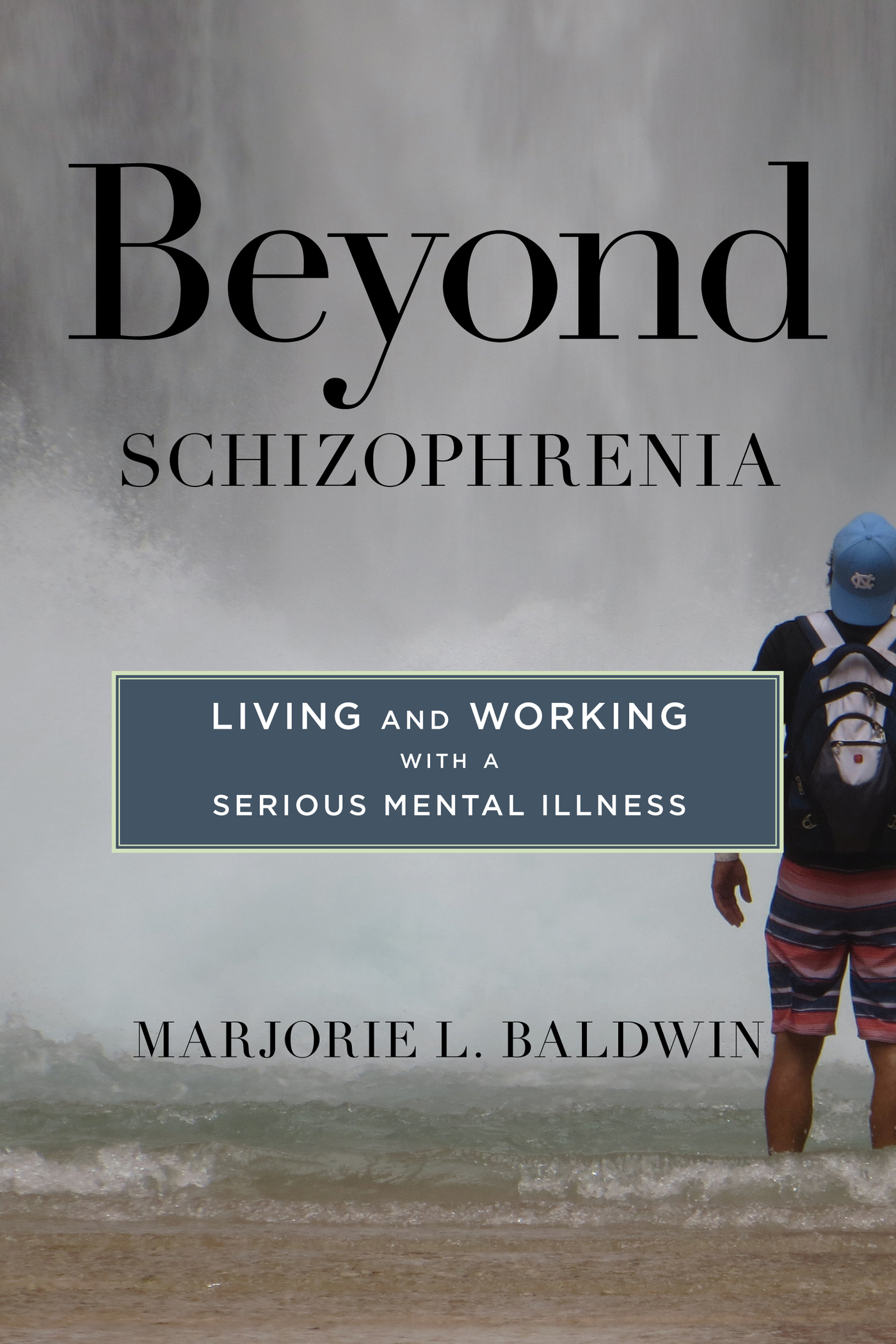Beyond Schizophrenia
Beyond Schizophrenia
Living and Working with a
Serious Mental Illness
Marjorie L. Baldwin
ROWMAN & LITTLEFIELD
Lanham Boulder New York London
Published by Rowman & Littlefield
A wholly owned subsidiary of The Rowman & Littlefield Publishing Group, Inc.
4501 Forbes Boulevard, Suite 200, Lanham, Maryland 20706
www.rowman.com
Unit A, Whitacre Mews, 26-34 Stannary Street, London SE11 4AB
Copyright 2016 by Rowman & Littlefield
All rights reserved. No part of this book may be reproduced in any form or by any electronic or mechanical means, including information storage and retrieval systems, without written permission from the publisher, except by a reviewer who may quote passages in a review.
British Library Cataloguing in Publication Information Available
Library of Congress Cataloging-in-Publication Data
Baldwin, Marjorie L., 1949
Beyond schizophrenia : Living and working with a serious mental illness / by Marjorie L. Baldwin.
pages cm
Includes bibliographical references and index.
ISBN 978-1-4422-4833-5 (cloth : alk. paper) -- ISBN 978-1-4422-4834-2 (electronic)
1. Mentally ill--Employment. 2. Schizophrenics--Employment. 3. Discrimination against the mentally ill. I. Title.
HV3005.B346 2016
331.5'94--dc23
2015032341
 TM The paper used in this publication meets the minimum requirements of American National Standard for Information Sciences Permanence of Paper for Printed Library Materials, ANSI/NISO Z39.48-1992.
TM The paper used in this publication meets the minimum requirements of American National Standard for Information Sciences Permanence of Paper for Printed Library Materials, ANSI/NISO Z39.48-1992.
Printed in the United States of America
For David
Whose courage, determination, and faith are
the heart and soul of this book
Preface
For the majority of civilized history, our treatment of persons with serious mental illness has been misguided at best, cruel and inhumane at worst. Thankfully, the psychiatric hospitals of 2015 are nothing like their predecessors of one hundred years ago. Today we have laws that establish the rights of persons with mental illness to live in the community, to make decisions about their treatment, and to work in jobs for which they are qualified. Unfortunately, for too many persons with serious mental illness the laws have translated into the right to live in a jail cell, or homeless on the street; the right to continue experiencing symptoms of psychosis, although effective treatments are available; and the right to work in a low-paid, low-skill job, dependent on government support. Today, persons with serious mental illness are no longer incarcerated in mental institutions for life, but they are still bound by low expectations, negative stereotypes, and the belief that they will never live a normal life.
In spring 1999, I was abruptly thrust into the world of mental illness when my younger son was diagnosed with schizophrenia. I was better prepared than most parents would likely be. As a health economist who studies discrimination against workers with disabilities, I was knowledgeable about the laws that protect my sons rights. I had connections to the psychiatric community, and the means to ensure he received the best possible care. Still, my encounters with the mental health services system often left me angry, frustrated, and feeling that I was on my own in caring for my son.
This book evolved from the dual perspectives of researcher and parent. As a researcher, I understand the sources of the intense stigma against persons with mental illness. As a parent, I have experienced that stigma first-hand. As a researcher, I realize that disabilities are disruptive to a persons education. But my son wanted to return to college, and I saw no reason why he should not. As a researcher, I know that vocational rehabilitation programs place most persons with serious mental illness in low-wage, low-skill jobs. As a parent, I wanted more for my son. Hence, each chapter begins with a story from my experience dealing with my sons illness, then continues with current research that informs the story.
In the research sections I have tried to present an unbiased view of current scholarship. However, I am aware that I cannot completely eliminate the bias that comes from my personal interactions with the mental health system. That experience has left me with a number of beliefs that appear as recurring themes throughout this work: that persons in their rational mind would not choose to be mentally ill; that persons with serious mental illness whose symptoms are in remission can make rational choices for themselves, and most would prefer to work; and that, with informed public policies, an unknown but substantial proportion of this population are capable of supporting themselves in competitive jobs.
Today, schizophrenia is a disease unlike any other in the intensity of stigma it evokes, the acceptability of that stigma, and the havoc it creates in the lives of patients and their families. All too often, the burden of the illness is exacerbated by a chaotic and unresponsive mental health system. I have written this book as a message of hopethat with more rational mental health policies, more people will be able to move beyond schizophrenia to have fulfilling and productive lives.
Acknowledgments
This project was jump-started with a sabbatical leave from Arizona State University (ASU) in 20132014. I thought I might wrap it up in a year, but I am now working long hours to meet my mid-2015 submission deadline. I am grateful to ASU for funding the sabbatical. Herb Schaffner was instrumental in forging my connection with Rowman & Littlefield, and Regina Herzlinger was instrumental in forging my connection with Herb.
I owe a special debt to Rebecca White for essentially coauthoring chapter 8 and for her skill and insight in helping to organize and conduct the interview survey. Colleen Healy greatly assisted with chapter 6, where her knowledge of the law and its bewildering terminology saved me countless errors. I benefited enormously from the thoughtful comments and criticism of Patrick W. Corrigan, Larry Davidson, Benjamin G. Druss, Danielle Freeman, Katie Greeno, Trevor Hadley, Mark S. Salzer, and Mark Olfson. Their valuable insights have surely enriched the final product.
I have benefited from the encouragement of many friends and family membersso many that I will not try to name them allas the work took shape, but my gratitude is not diminished by my poor memory. Thank you, CJ OConnor, not just for your optimistic encouragement, but also for your buoyant attitude and ever-present inspiration in my life. Thank you, Fred Baldwin, for helping to fill in the gaps in my memory, and for always being there for our son.
And thank you, Steven Marcus, my research partner of twenty-five years and counting. You are never short on insight, creativity, and kindness. Without your persistence, the data reported in chapter 10 would not exist. Indeed, the entire project would not exist. Finally, thank you, Allan, for believing in me and my work, for your insights that have shaped so much of this work, and for assuming the role of stepfather with grace, compassion, and love. Most of all, thank you for adopting my dream as your own.
Part I
Living with Schizophrenia
Chapter 1
A Disease Unlike Any Other
Everything Bad Is Good Again
Spring 1999
On the day my twenty-one-year-old son was admitted to the psychiatric unit at University of North Carolina (UNC) hospital, my overwhelming emotion was relief. At least I knew where he was: He was safe; and he was with people who understood what was wrong. I was too numb, then, to appreciate how irrevocably our lives would change after that day.
Next page
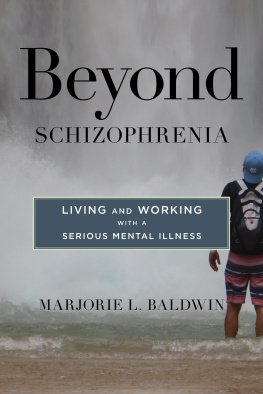


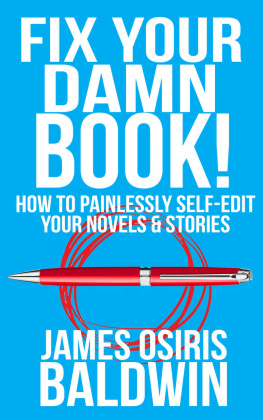







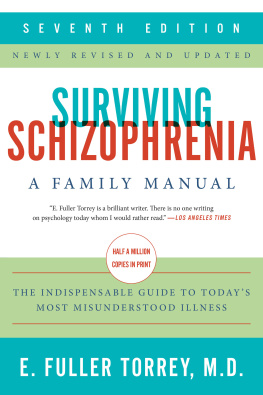
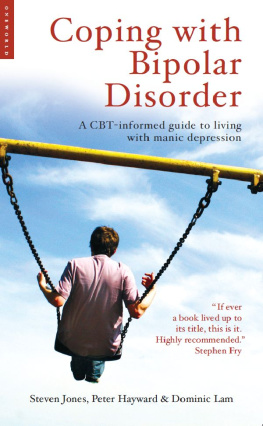

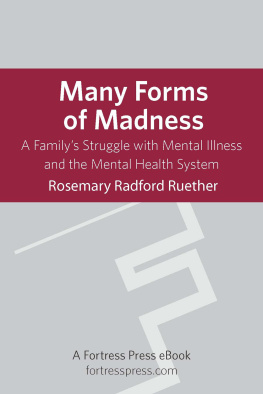
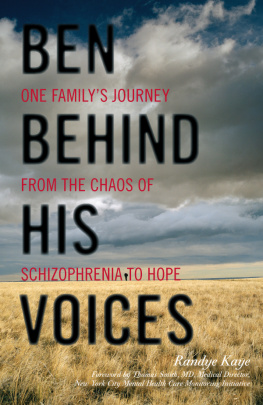
 TM The paper used in this publication meets the minimum requirements of American National Standard for Information Sciences Permanence of Paper for Printed Library Materials, ANSI/NISO Z39.48-1992.
TM The paper used in this publication meets the minimum requirements of American National Standard for Information Sciences Permanence of Paper for Printed Library Materials, ANSI/NISO Z39.48-1992.